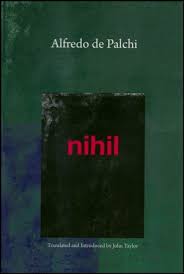|
Nihil by Alfredo de Palchi, Translated by John Taylor (Xenos Books, 2017)
Review by Greg Bem (@gregbem) On the periphery: Coral Rock by Archie Shepp “More generally, such a poetics represents still another aspect of de Palchi’s search for what is primary, rudimentary, that is, for whatever underlies our experience of ourselves, the sexually desired Other, humanity, and the cosmos.” (from John Taylor's introduction, page 8) it’s my mythical river and I intend to drift down it, with anecdotes and poems, into the youthful years before my life was hunted down [. . .] (from Nihil 1) I read the words of an author whose realm of existence is one of absence, whose realm of absence is one of existence. Pendulums we’ve known from a godless, egotistic damnation swing. The 20th century moves into the 21st, and none of the tensions have been relieved. The grand lights of forever turn on only to turn off and bring us a black, blank space, and then, flip the page, and there they turn on again. There is balance in the universe as there is balance in this book, Nihil. A causeway of varying energies and reciprocations. Yin and Yang. Open, closed. Closed, open. Stomping about, or dormant. Presence and the presence of abstained presence. Italian Alfredo de Palchi’s Nihil is a complicated book that evokes the substance of something arriving at and through the power of nothing, where nothing may be but does not need to be emptiness, negativity, suffering, or violence. It is all here, in this autobiographical manifest claiming life as what cannot be claimed. Here we have a heart wrenching naturalism for the 21st century. It is one that relies on the empathy of the reader, and is leveraged by the undiminishing necessity for human bondage. Its core is a sinking grit that sits beyond the skin, impressing itself into muscle tissue, bone, and the spell-dazed marrow of our walking throws and waking abatements. where are you, and me, where am I in the morning as my mind explores the reason why we have to perish because of the return from nothingness? (Nihil 3, #14) Translated by the smoky, casual tumult of John Taylor, a skilled and ongoing poet of his own verse-mind, this book’s three-section sequence (composed of Nihil 1, Nihil 2, and Nihil 3) is an ouroboric burst wrapping within itself, creating patterns, passageways, and ambient scenarios that are fascinating doorways into the grueling, effervescent transience of de Palchi’s migration to and duration with an American reality. Nihil contains marveled subtext, elongated entwining vocalism, and a stirring of emotional endurance that wraps the book up neatly from cover to cover. With this collection’s writing ranging from 1998 to 2013, the reader is capable of being substantially absorbed in the conflux of de Palchi’s experiences through life in the US, as well as his earlier years living in a world-stricken Italy. The experiences are represented through short emergences of image and narrative with each pass from one page to the next. As the nature of the book through its title and thorough introductory text suggests, much of Nihil deals with an astute and antagonizing degree of nothingness, and nothingness becomes idealized through the white space on the page, through the poems themselves. Not always on my knees and spitting out blood . . . I’m the battered old tower of the caved-in local church --from the worn-out bell from the electrified crackling (from Nihil 2) The poems themselves are like inhalations and exhalations in a gaseous world of forever. They are the vacuum before the cosmos. These poems are the disheartening fleeting of time. With everything there is, there is also lack. There is nothing, and there is everything all the same. What is being left out in any given poem becomes part of the challenge in better understanding the foundational, spiritual tones of the book. I find that de Palchi’s use of form is where we find these effects most clearly. This experience arrives through a harmonious presence of prose poems and verse poems, and those that blend both together. While the forms do not have blunt intentionality, their duality (and triangulation when brought together) reflect the craft in this poet’s practice. The shifting and shaping of the image between prose and verse often feels like a rupture or furrow that one becomes drawn into, entrapped by. It is maddening and beautiful. It is unstoppable and ecstatic. The reading experience, by extension, is one of intense pressure. There is an outstanding quality to the inclusion of prose and verse that results in a mind on the verge of both curiosity and confusion, but also at the mercy of presence: the poems continue, and they continue, and they continue. We hope to find more meaning, and perhaps we will, but nothing is certain. with a syringe in my vein, you’re staring with your oriental eyes, you’re transfusing the poisonous serum into my blood to banish the evil poison; I call you Leukemia [. . .] (from Nihil 3, #49) Nihil is a bold and daring book. It is one of blood and ether. A book of trial and the damnation of witness. It is a book of residue and result, but also a book of assuage and critique. That hidden vortex of meaning behind each of the poems, from their levels of biography to the reason behind such brilliant emotional resilience, is one that can be interpreted, making this not only a fantastically challenging void of poetic work, but a fantastically impressionable sequence of writing to be enjoyed. All of its qualities spin it into the fever dream today’s maddening world of everything and nothing demand.
0 Comments
Your comment will be posted after it is approved.
Leave a Reply. |
Welcome to Yellow Rabbits. Thanks for visiting.
All reviews by Greg Bem unless marked otherwise.
SearchYellow Rabbits Reviews
Archives by Month
August 2019
|

